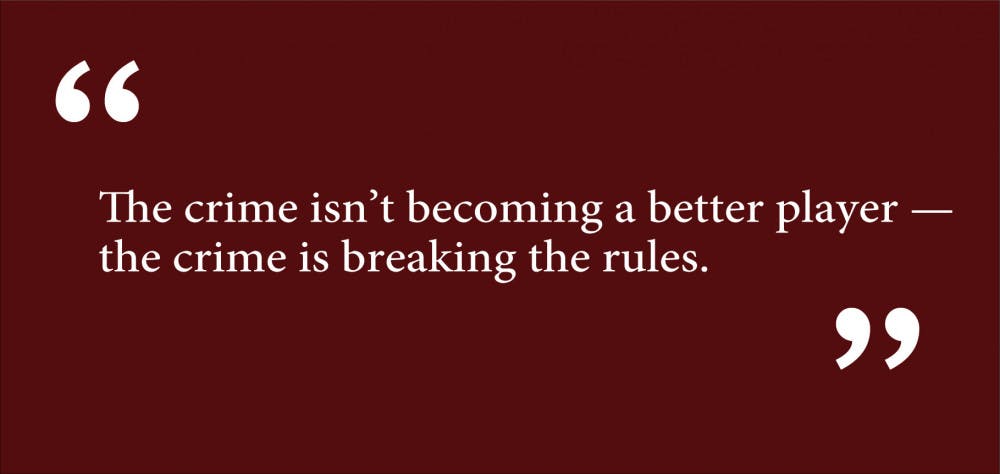The calls went out just after 6 p.m. Wednesday night: Four new members were elected to the Baseball Hall of Fame. Minutes later, MLB Network announced the news. And as it did, I breathed a sigh of relief.
I was happy, not so much for Chipper Jones, Vladimir Guerrero, Jim Thome and Trevor Hoffman — though all of these inductees were deserving — but rather, about the vote totals for candidates lower down on the list. Prior to the announcement, publicly available ballots showed Barry Bonds and Roger Clemens, the two kingpins of baseball’s steroid era, trending upward by as much as 10 percent. But when the final vote came out, the jump was much smaller at around three. Both with vote shares near 54 percent on the 2017 ballot, Clemens’ and Bonds’ numbers rose to 57.3 percent and 56.4 percent, respectively — about as modest an increase as I could have hoped for.
I realize I have never directly addressed the steroid issue before, so let me make my position crystal clear. Steroid users do not belong in the Hall of Fame. Bonds and Clemens should remain on the ballot until their time on it expires. The Hall isn’t just a museum, as some claim; it is an honor. And no cheater deserves to be awarded the highest honor baseball bestows.
I can already hear the indignant responses, so I’ll address them. Some will ask, “But what about the other cheaters? What about Gaylord Perry?” Easy: He should never have been elected either. I don’t know what the Baseball Writers’ Association of America was thinking when it inducted him. And before you bring up another common argument, something as prevalent as stealing signs isn’t cheating, for the simple reason that it’s not against the rules — at least in its traditional form. But flagrant cheaters, whether they throw banned pitches or take banned substances, have no place in the Hall of Fame. We can’t kick them out, but we can stop electing them in the first place.
Some, too, will argue that Bonds and Clemens would have been Hall of Fame material even without performance-enhancing drugs. I’ve never thought much of this argument. For one, it requires fans and voters to construct an entire hypothetical career based on a complex set of unknown medical circumstances. Who knows whether Sammy Sosa would have been a Hall of Famer without performance-enhancing drugs either — and if so, should we let him in as well? Additionally, this argument treats steroid use very strangely — it says that breaking the rules is fine as long as you’re good enough.
This runs counter to the fundamental notion of fairness. If a batter uses a corked bat and hits a home run, should he go without punishment if he’s so strong that the ball would have gone over the fence even without the cork? Of course not. The crime isn’t becoming a better player — the crime is breaking the rules. Clemens’ and Bonds’ natural talent is irrelevant here. They cheated and are now deservedly being punished for it, as cheaters should be.
Some will argue that keeping Bonds and Clemens out of the Hall is an affront to history. They were the most important players of their generation, the argument goes: We can’t just pretend they didn’t exist. But we should not celebrate them.
Do we really want to bestow an enormous honor on people just because they were historically significant? It’s not hard to recognize history without honoring it. We’ve preserved the story of Watergate in books, newspapers and movies; there’s no need to raise a plaque praising former president Richard Nixon. We won’t forget Bonds or Clemens either: We just don’t need to honor them. If the Hall of Fame were solely a museum, then of course they’d be included. But it’s not. There is a museum portion of the building; I’m fairly sure Bonds and Clemens, and objects related to them, are already featured there. But being elected and enshrined is a different matter.
Finally, some people, in an attempt to strike some kind of balance, argue that Bonds and Clemens should be inducted, but their plaques should display their transgressions. Really? Is this what we want? “Barry Bonds, a possibly illegitimate slugger who set the all-time home run record while cheating…” or “Roger Clemens, seven-time Cy Young Award Winner who may have deserved some of them but certainly not all…” Absurd. If the violation is so bad that it has to be written on a player’s Hall of Fame plaque, it’s far better not to induct the player at all.
I’ve been to the Baseball Hall of Fame once, in 2005, and I can tell you how truly wonderful it is. Right in the heart of Cooperstown, a beautiful village by Otsego Lake with a main street right out of Disneyland, it really is a temple to the great American game that is baseball. And that beautiful building, a shrine to our national pastime, deserves the best: players who worked hard, who honed their talent and followed the rules. A ticket to Cooperstown — and a plaque in that building — is reserved for the best of the best. And there should never be any room for cheaters.
James Schapiro '19 can be reached at james_schapiro@brown.edu.





